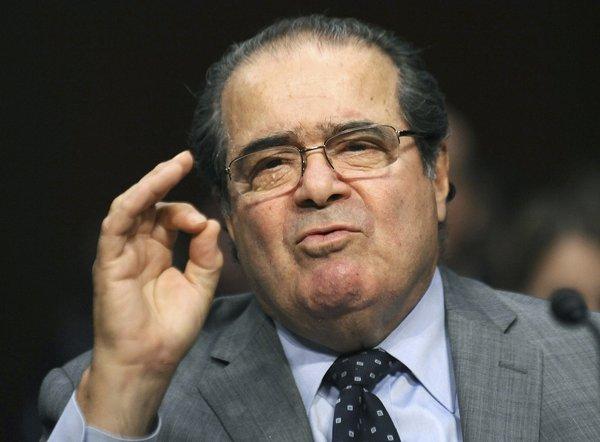Will Slater Every American generation suffers the unexpected death of at least one of its great citizens. Our parents’ generation lost the Kennedy brothers, before them was FDR’s shortened fourth term in office and of course, the assassination of Lincoln. These losses rip our society to its core, because they leave us exposed, without the protective, shielding arms of our leaders. Even kids feel the weight of these deaths, how could they not, as the nation is permanently devoid of an identity- creating figure. Supreme Court Justice Antonin Scalia was one of these American titans. Justice Scalia dominated the Supreme Court, serving for almost thirty years. Following a nomination by president Ronald Reagan, Scalia was an instant force in the court and perhaps one of its most influential figures. Throughout his term, Scalia held himself to a high standard of observance to the Constitution, leading with the principles of textualism and originalism (a heightened emphasis on the Constitution and other texts). Known as the most outspoken and one of the most conservative justices, Scalia was an inherently controversial figure, but one that should burn bright in America’s national memory, more hero than villain. Antonin Scalia died on February 13th, and with his passing joins the likes of Kennedy, Roosevelt and Lincoln. Sometimes it can be hard to separate man from his legacy. With Justice Scalia, this won’t be the case. His sharp tongue, wit and verbal creativity had a direct and lasting impact on not only his fellow justices, the cases they argued and the decisions they made, but on a generation of judges and lawyers. The court is often marked with legal jargon, which is what made Scalia’s candor so refreshing. Using phrases like “pure applesauce,” “so obvious” and “jiggery pokery” (what?), Scalia changed the way the law was talked about. Upper school history teacher, Ms. Gallagher, sat in on three Supreme Court cases involving the late justice, and was always impressed and entertained by the dissents he would read, not only for the legal content, but, in her words, “he was filled with salt and vinegar, and would just spew what he was unhappy about.” In a recent article she wrote for Jonathan Turley, Ms. Gallagher explained her complicated relationship with Scalia, and admiration for his opinions, as she “was likely going to disagree with the opinion before [she] read it and end up virtually persuaded by it at the end.” Ms. Gallagher goes on, Scalia’s “profound sense of American and European history always nearly convinced me why I should come his way.” However, Ms. Gallagher also explained in her article that, during the affirmative action case last year, the Justice overstepped his bounds and perhaps gave his critics more ammunition. She explained that it was his behavior in the aforementioned case that “reminded [her] of the intolerant Scalia,” the Scalia much of America hated. For his conservative, and at times harsh ways, many rejoiced at the news of the justice’s death. The justice dissented on Roe v. Wade, same-sex marriage, the Affordable Care Act, and joined the majority in the Citizens United case and on deciding on the Voting Rights Act. These are, generally speaking, minority opinions in America, and certainly at liberally- slanted Latin. At times, it can be hard to reconcile these two things: the legality of a decision vs. the morality of it. It can be hard to separate one’s political opinion from their legal opinion. It is true that the Supreme Court is supposed to rule on the constitutionality of cases placed in front of them, and not the impact their decision might have. It is with this that we understand that Scalia’s vote on, say, same-sex marriage, was in theory not a product of his personal opinion on the matter, but of his reading of the constitution. Supporters of same-sex marriage can’t hate him for that, they can’t call him a bigot or a homophobe, they can merely disagree with his understanding. Justice Scalia held a greater, enduring vision of American democracy. It was his contention that social change should not occur through the Supreme Court. In his dissent in the same- sex marriage case, Scalia wrote, “Today’s decree says that my Ruler, and the Ruler of 320 million Americans coast-to-coast, is a majority of the nine lawyers on the Supreme Court. The opinion in these cases is the furthest extension in fact— and the furthest extension one can even imagine—of the Court’s claimed power to create “liberties” that the Constitution and its Amendments neglect to mention.” This philosophy of Scalia’s extended beyond same-sex marriage to many of the laws that he was so disliked for. If it was truly the will of America to make such great changes to our lifestyle, then we would pass laws through legislation, not the courts. Almost immediately following Scalia’s death, America was thrust into a national debate over the appointment of a replacement justice. Traditionally, the president nominates an appointee for the spot on the bench, and Congress confirms/rejects him or her. This term’s Republican Congress has no intention of allowing President Obama to place a liberal justice in power, hoping to delay the process until a new president is in office. With Obama recently declaring his intentions to appoint someone, it seems we face an impasse. Ms. Gallagher pointed out a little talked about aspect of this situation, that the Constitution is exceedingly vague on the aforementioned process. The Appointments Clause of Article II, Section II, goes as follows: “He[The President] shall have the Power, by and with the Advice and Consent of the Senate to… nominate…Justices of the Supreme Court.” What does advice and consent really mean? Is Obama tied to precedent or will he choose how he interprets these words, especially, as Ms. Gallagher points out, considering that this president in know for his executive orders. These are important questions, yes, but we must not fail to recognize the momentousness of Justice Scalia’s passing. Ms. Gallagher made a point of telling me that students should stop and consider this moment, for not often do such high ranking and historic government officials pass away unexpectedly. It will be, she promises an “I was there” moment in all of our lives. We can disagree on Scalia’s decisions, but we can’t miss the power of his words, and we certainly can’t question his desire to protect American values. The justice should not be anglicized in death, no one should be, but he has become our generation’s great citizen, lost to unexpected death. “You have enemies? Good. That means you’ve stood up for something, sometime in your life.” –Winston Churchill Rest in peace, Justice Scalia. For a more in- depth look at Antonin Scalia, be sure to read Ms. Gallagher’s fascinating and powerful article at https://jonathanturley.org/2016/02/21/so-long-justice-scalia/?platform=hootsuite]]>
Categories:
Examining the Legacy of Justice Antonin Scalia
March 1, 2016

0
More to Discover

























































